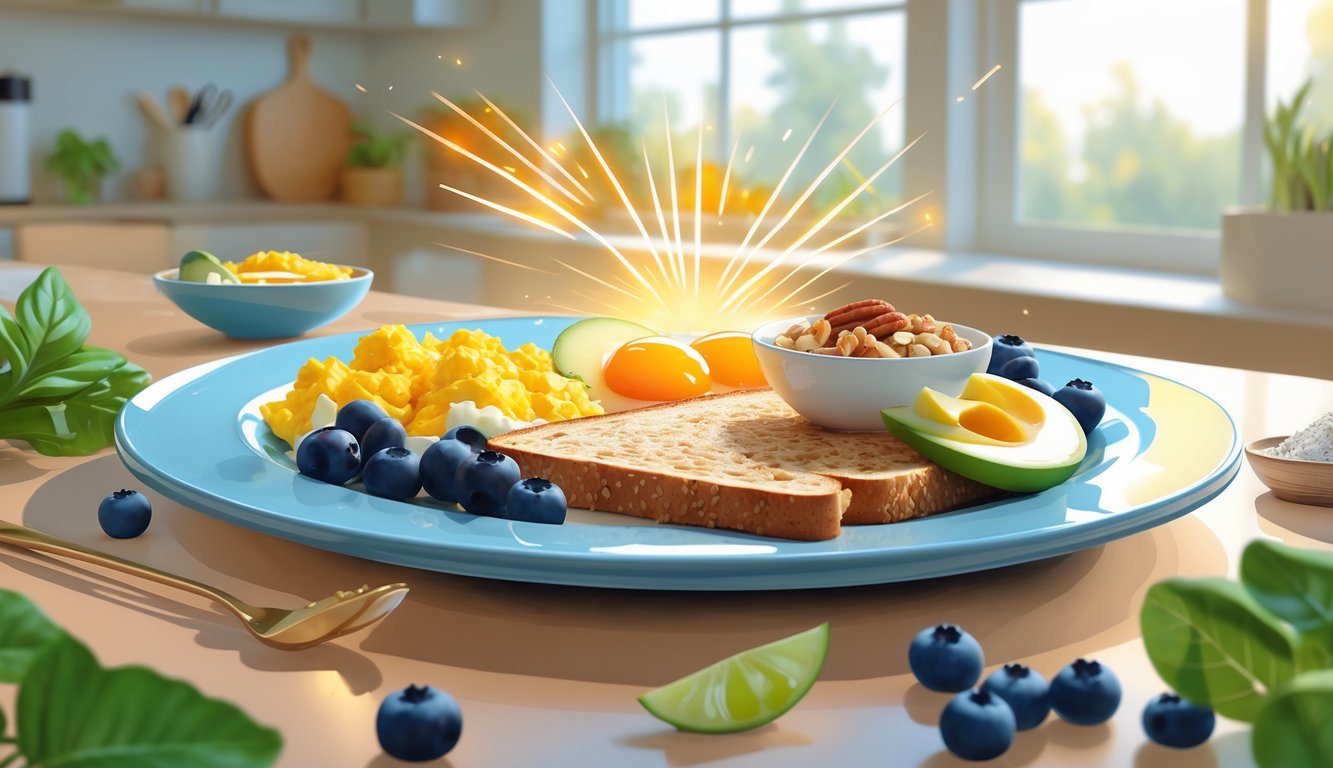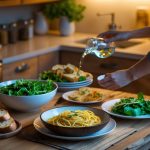
Essential Nutrients for Busy Mornings

Mornings implode fast—lost keys, dead phone, empty cereal box—so I’m convinced the right nutrients matter way more than anyone admits. If I skip a real breakfast, I’m basically useless. Packing in protein, fiber from whole grains, and the kind of vitamins that supposedly “boost brain power” (or at least keep me awake in meetings) seems to work better than any app I’ve downloaded for “focus.”
Protein for Lasting Energy
I vaguely remember the Mayo Clinic raving about eggs being a breakfast “anchor.” Loading up on complete proteins—eggs, Greek yogurt, nut butters, tofu—actually keeps me from raiding the snack drawer mid-morning. I used to think protein was just steak or chicken, but cottage cheese on toast or a tub of skyr actually fills me up more than a sad drive-thru hash brown.
Dietitians say 15–30 grams of protein in the morning keeps blood sugar stable and energy steady. Edam cheese slices? Sneaky protein bomb. A JAMA study says spreading protein out across meals helps with muscle and alertness—good news if you’re glued to a desk all day. Sometimes I just end up with peanut butter on my shirt, though. That’s a separate issue.
Incorporating Fiber and Whole Grains
Oatmeal—the kind that turns into glue if you blink—actually works for my stomach. Fiber from whole grains (steel-cut oats, barley, seeded bread) keeps blood sugar from spiking and means I’m not starving by 10:30. Some RD I follow says Americans average only 16g fiber a day (supposed to be 25–38g), probably because drive-thru food is a fiber wasteland.
Honestly, the only time I felt “full” till lunch was when I tossed chia seeds in yogurt or added extra berries. Fiber and whole grains bring magnesium and potassium, which I thought only mattered for cramps, but apparently a neurologist says potassium “modulates neuronal firing,” so breakfast can literally make you smarter. Maybe.
Vitamins and Minerals for Brain Power
Vitamin B12 doesn’t magically make Mondays better, but I swear my brain works better when I don’t skip it for weeks. Multigrain cereals with iron, calcium, and random vitamins are basically nutrition insurance for mornings when I can’t even. I doubt you need a cartoon tiger for absorption, though.
Magnesium gets zero hype, but dietitians keep saying low magnesium means your brain can’t find your wallet (or, you know, focus). Potassium isn’t just about bananas—try avocado toast with pumpkin seeds on real whole grain bread. For breakfast, that’s as close as I get to remembering my vitamins without a pill case. Some days, even when I eat all that, I forget my water bottle and spend the day in a fog. Still, way better than eating a sad toaster pastry and pretending it counts.
Building an Energizing Breakfast Plate

Alright, so breakfast. I keep thinking if I hear one more “energy hack” that leaves me face-planting by 10 a.m., I’m going to start a petition. All these tips about smart protein, healthy fats, portion sizes—sure, but then I’m running late, and somehow a random pile of carbs sneaks onto my plate anyway. Consistency’s supposed to matter for steady energy, right? I wouldn’t know; most mornings are chaos.
Combining Healthy Fats and Lean Protein
Every single time I skimp on protein, I’m crashing before anyone even mentions the word “spreadsheet.” So, yeah, I try to stick with 15–25 grams: Greek yogurt, eggs, cottage cheese, tofu if I’m feeling ambitious (rare). Nothing fancy. Scrambled eggs, overnight oats with a scoop of protein—done. Overthinking it just means I end up with dry toast and regret.
Healthy fats? I forget them all the time, then wonder why I’m starving by 9:30. Nuts, avocado, sometimes olive oil on toast (which is totally breakfast, not just for salads, sorry). Apparently, fat slows digestion; some meta-analysis in Nutrients said it helps with glucose spikes. Dietitians keep telling me: combine fat and protein or pay the price. They’re probably right.
One time I tried just carbs—instant regret. Peanut butter on multigrain bread, though? Not exactly revolutionary, but at least I don’t pass out before lunch. And it’s fast, which is all I really care about when I’m running out the door.
Maintaining Portion Control
I used to roll my eyes at measuring food. Who has time? Then I realized my “healthy breakfast” was probably half my day’s calories because apparently, I can’t eyeball peanut butter. Doctors say 400–500 calories is enough for most adults; I didn’t care until my smartwatch started guilt-tripping me. Now I check labels like a weirdo.
Swapping dinner plates for bowls—yeah, I know, sounds silly. But it works. There’s some review in the International Journal of Obesity about smaller plates lowering calorie intake. My friend with the cereal bowls the size of a mixing basin? Still doesn’t care. Whatever.
I try to split breakfast: half veggies or fruit, a quarter protein, a quarter carbs. Not just some dusty food pyramid thing—it actually makes grocery shopping easier. And when I use my hand as a guide (palm for protein, fist carbs, thumb fats), I don’t end up with “how is this a serving?” confusion. I swore I’d never use that dietitian trick. Now I do it every day.
Optimizing Complex Carbohydrates
Switching out refined carbs for complex ones at 6:30 a.m. when my brain’s barely online? Not happening unless I’ve got oatmeal or whole-grain English muffins right there. After I accidentally bought “whole wheat” cookies (spoiler: not healthy), I started checking for at least 3g fiber per serving. Fiber actually keeps me full. My glucose monitor doesn’t freak out as much as it does with white bread.
Harvard says people who eat oats have “smoother energy.” Is that real or just marketing? No clue. But I do know fruit with the skin left on adds more fiber, and my stomach seems happier. Why do bananas always disappear from the break room but apples sit there forever? Riddle of the universe.
I get bored, so I just throw in chia seeds, berries, cinnamon (supposedly helps with glucose, but Diabetes Care wasn’t impressed). Sometimes I put black beans in a breakfast burrito, and my family acts like I’m a criminal. Whatever, it’s protein and carbs and less dishwashing.



